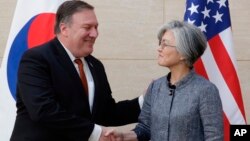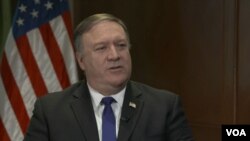A gap is growing between Washington and Seoul over an inter-Korean military pact that Washington worries might weaken South Korea's defenses against a North Korea attack.
South Korean Foreign Minister Kang Kyung-wha said U.S. Secretary of State Mike Pompeo expressed discontent when she spoke to him after Seoul outlined plans to sign a military agreement with Pyongyang at the third inter-Korean summit in September.
Pompeo's concern over Seoul's military agreement with Pyongyang comes as relations cool between South Korea and the United States. The growing distance is the result of inter-Korean ties that seem to be getting warmer and faster than the North is making progress in denuclearization.
US, South Korea Again Call Off Major Drill
The United States and South Korea have suspended another major military exercise in a continued push for diplomacy, the Pentagon said Friday.
According to Bruce Bechtol, a retired Marine and former intelligence officer at the Defense Intelligence Agency, who researches North Korea's military at Angelo State University in Texas, Seoul made concessions in the military deal, while Pyongyang gave up very little.
"(South Korean) President Moon (Jae-in) is rushing into a lot of moves before the North Koreans actually make their own reciprocal moves," Bechtol said. "And I think that that's dangerous."
The agreement includes setting up a no-fly zone, as well as maritime and ground buffer zones around the Demilitarized Zone (DMZ), the area that divides the two Koreas. The two also agreed to stop military drills targeting each other near the military demarcation line that runs within the DMZ.
In an effort to create "a peace zone" along the heavily fortified border near the DMZ, Seoul and Pyongyang agreed to clear landmines near the area. The process began Oct. 1.
The United Nations Command (UNC), led by the U.S., oversees the 2.4-kilometer-wide DMZ.
The commander of the U.S. Forces in Korea (USFK) serves as the commander in chief of the UNC and the Combined Forces Command (CFC). South Korea and U.S. forces operate jointly under the CFC to defend the southern half of the Korean Peninsula.
The UNC said in a statement that it had "reviewed and verified the mine clearance work" and added that it "will continue to work closely" with the two Koreas "to synchronize implementation efforts on the way ahead."
Experts worry the agreement could make it harder for South Korean and U.S. forces to fend off a North Korean attack.
Frank Aum, who served as the senior adviser of North Korea in the Office of the Secretary of Defense and is currently a senior expert on North Korea at the U.S. Institute of Peace, is concerned a no-fly zone will blindfold the U.S. and South Korean forces that monitor North Korean activities in the DMZ.
"The scope of the no-fly zone could weaken the alliance's ability to conduct intelligence, surveillance and reconnaissance operations, as well as access U.S. bases within the zones," Aum said.
Suspending military drills near the military demarcation line will curtail the ability of South Korean and U.S. forces to guard against potential North Korean aggression, according to David Maxwell, a former Special Forces colonel who served on the UNC, CFC and USFK, and is now a senior fellow at the Foundation for Defense of Democracies.
"The inability to train, to include live fire training in the vicinity of the DMZ will reduce (the CFC's) readiness to defeat North Korean artillery that (could) initiate hostilities," Maxwell said.
Bechtol said South Korea will become vulnerable to a potential North Korean attack when landmines and guard posts are removed in the DMZ area, which were set up to stall North Korean forces from advancing to the South.
"These are all things that can give the South Korean army early warning and stop an attack if it actually occurs," Bechtol said.
Demining the DMZ, according to Maxwell, gives North Korea a strategic advantage for mounting an offensive.
"The removal of mines in the three major attack corridors, Kaesong-Munsan, Chorwon and the East Coast, provides an advantage to the North, should it choose to attack," he said.
Bruce Bennett, a senior defense analyst at the RAND Corp., said creating a 10-kilometer-wide ground buffer zone and removing guard posts in the DMZ will open a route for the North to undermine Seoul's defenses, as well as its domestic activities.
"If the Demilitarized Zone becomes an open port of access into South Korea, they could be funneling all kinds of agents into the South who would do anything from collection of information to sabotage activities," Bennett said.
"The North has always made the invasion of the South a priority and also subversion of the South a priority. And so a failure to control the border area makes major risks in terms of kinds of actions that the North Koreans could do," Bennett added.
Despite the concerns, General B.B. Bell, commander of the CFC from 2006 to 2008, thinks the alliance bound by the Mutual Defense Treaty, signed between the U.S. and South Korea at the end of the Korean War in 1953, secures Seoul's defense.
"So, that serves (sends) a significant message to any aggressor, including North Korea," Bell said. "And no matter how many steps are taken to reduce tensions by ratcheting down military activities, no matter what happens, that alliance guarantees that should the North attempt some type of military adventurism to either provoke or seriously threaten (South Korea), the United States will go to war with the North with our ally South Korea. Period."
Bell thinks the U.S. and South Korea should maintain readiness, while demanding North Korea remove its conventional offensive capabilities, including its artillery and forward deployed forces directed against the South.
On Tuesday, officers from the UNC and the two Koreas met for the first time since the two Koreas signed the Comprehensive Military Agreement (CMA) and discussed disarming the border village of Panmunjom, also known as the Joint Security Area within the DMZ, as the two Koreas agreed in the inter-Korean pact.
U.S. General Vincent Brooks, who leads the UNC and commands the USFK, said, "I am encouraged by this productive, trilateral dialogue."
The UNC and the two Koreas agreed to continue trilateral military meetings, according to a press release from the USFK, which said "Topics for future meetings will likely include implementing details of such matters as removing guard posts, reducing security personnel, and adjusting surveillance equipment."
U.S. Secretary of State Pompeo, interviewed Friday in Mexico City by VOA contributor Greta Van Susteren, said a second meeting between President Donald Trump and North Korean leader Kim Jong Un is being planned.
"I'm not prepared to tell you when it's going to be, as the date has not yet been set, but the president's committed to doing that," Pompeo said. "We're working on finding dates and times and places that will work for each of the two leaders. I'm very hopeful we'll have senior leader meetings here in the next week and a half or so between myself and my counterpart to continue this discussion."
Pompeo said Kim told him, during their meeting two weeks ago, that "he stands by the commitment he made to President Trump in Singapore on June 12th" for denuclearization.
Trump and Kim met in Singapore in June, and officials have been working on a second summit since then, the official said.
Later Friday, however, Reuters news agency quoted a senior administration official as saying the next summit between the two leaders would not occur until "sometime after the first of the year."
Fern Robinson contributed to this report.





